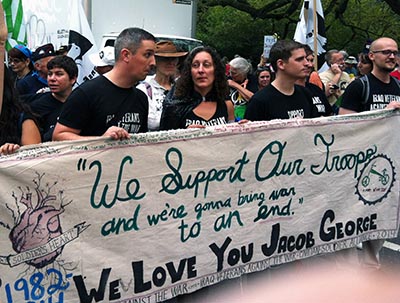 |
It Really Is Life Or DeathBy Maggie MartinThis year Iraq Veterans Against the War (IVAW) celebrates a decade of struggle. Unfortunately, I am reflecting on this milestone through the fog of intense grief. On September 18th, 2014 we lost our brother Jacob George to suicide. Jacob spent the years after returning from Afghanistan speaking out against war and militarism, standing up for justice and self determination for the people of Afghanistan and speaking to the need for veterans to heal as part of a community. He carried the load of PTSD, moral injury, and the sickness in the society he came home to as he rode his bike for thousands of miles across the US, singing songs and telling stories as an act of resistance and of hope.
IVAW was born of that same need to resist, that same instinct to believe another world is possible. Trying to get there is not easy. We've had 10 years of extraordinary ups and downs, with beautiful transformation and painful ruptures. Moments where we felt powerful and unified peppered in between long periods of struggle, hard work, infighting and isolation. For every answer we find we seem to uncover infinite questions. So what does it all mean? Making meaning is part of our journey, both by coming to terms with our experiences, and finding ways that they may fuel change. Popular education is about sharing ourselves and the understandings gained from experience. These are some of the key reflections from my time with IVAW and from lessons passed down by those who built this organization before I came. This work is full of contradictions and nuance. Over simplification and unwillingness to yield can stop the work, just as brushing off concerns or rushing through decisions can do the same or cause the team to quickly unravel. We've had disagreements about either/or when the answer was both. Do we work to stop the wars or to take care of ourselves and other veterans? Are we going to have national initiatives or do the chapters lead the work? Do we need to focus on building community or do we challenge the power structure? Looking for intersections in our perspectives helps accomplish the work we are passionate about as part of a larger effort. Working collectively, we have the answers to the issues we are facing. Any one person who says they know it all is full of shit. There is no charismatic leader in our organization, no one person we look to for ultimate authority and that's as it should be. We are many leaders with many different skill-sets, strengths, and weaknesses. We are at our best when we are working in concert with each other, when ideas are shared freely and openly and when the best ones rise to the top with support from the whole. Change takes time. Early in our existence, IVAW members thought that if we simply told the truth about the wars the American people would demand their end. Then we would be on our way to winning care for veterans and reparations for the people of Iraq and Afghanistan. Many years of speaking out as the war machine continued to rage on lead us to look into strategic campaigns. Now we have a long-term vision for the world we want to see and we ask ourselves with every decision if it is taking us closer to that vision. We need to be able to fight both locally and nationally. The energy of campaigns challenging the power structure give our organizations the power to transform into movements that will win sweeping victories. Building momentum and strategic campaigns takes community, commitment, and leadership development. With members spread across the country, we do best when we are active members of our local communities standing with other like-minded organizations, building powerful ties, practicing our skills and meeting people who care about the work we are doing. IVAW's active members are the lifeblood. We draw our power from the members and supporters engaged in the organization. If we stop writing, making art, gathering, taking action, teaching, learning, and sharing those results with the world, we will cease to exist. However, as long as we continue, we are a community. No matter what we face, no matter what our name is. There is nothing sacred about our non-profit structure or even the name that we call ourselves. What is sacred is the bond of resisting and hoping together. Take care of each other and ourselves. If someone told me today that they thought doing this work was easy, I wouldn't believe them. This work is not easy. It's gut wrenching and soul consuming. We're dealing with life and death situations where we feel next to powerless. The odds are against us in every visible way, yet somehow it is still worth it. Even still, it's worth it for so many because it feeds us, too. We are up against so much already, we need to be hands of support and words of encouragement to each other. That too, is a matter of life and death. Maggie Martin is a Co-Director of Iraq Veterans Against the War. she's been a member with IVAW since 2007. Maggie was in the Army from 2001-2006, she deployed three times; to Kuwait in 2002 and Iraq in 2003, and 2005. Maggie has a M.A. in Social Justice.
|


